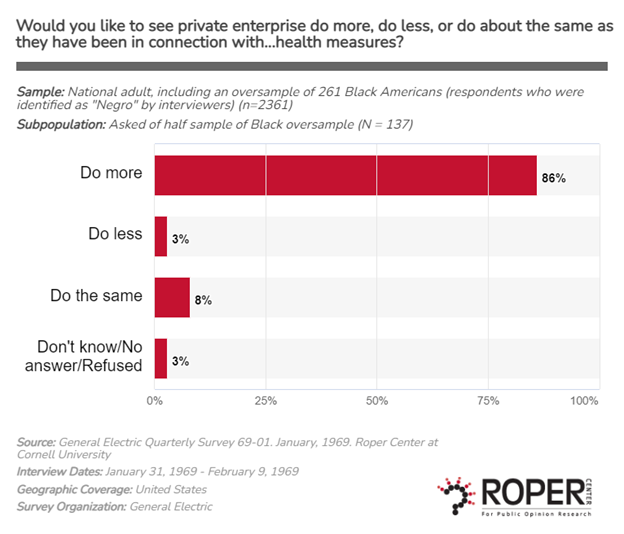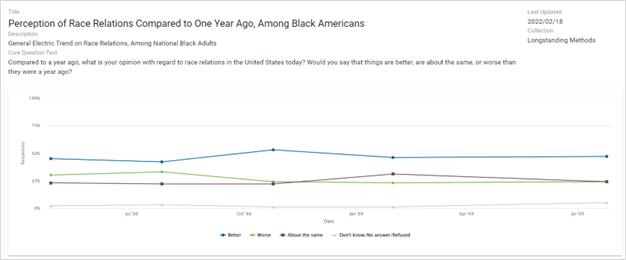General Electric
For nearly two decades, from 1965 to 1982, General Electric conducted quarterly public opinion surveys. Each survey had a national adult sample, but at different points in the series, additional populations were also targeted: 58 college student samples, 21 samples of professionals/managers, and 12 Black American samples, generally of approximately 250 or 350 people. Although the separate Black American sample was not continued, the national adult samples also remained large enough to allow analysis of Black attitudes. Topics included issues that most concern the respondent; personal financial situation; priorities for government spending; awareness of technological and commercial developments in areas where General Electric had interests, like nuclear energy and supersonic planes; the respondent’s community; current and future state of race relations; jobs; and the role of private industry in addressing the country’s issues and improving race relations.
Repeated questions about the role of large companies in helping race relations show General Electric’s interest in understanding consumer expectations in a larger economic and community context, while questions about consumer awareness of various technological advancements in GE areas of investment are typical of more traditional market research.

Although these surveys were completed with Black oversamples for only a few short years, those years were tumultuous ones in which the relative stability of perceptions of race relations are notable.

Because the sample sizes are large enough to analyze responses by some demographics, researchers have the opportunity to learn more about differences of opinion within the Black community. For example, older Black respondents were more pessimistic about their future financial situation, and they rated the current state of race relations compared to the previous year more negatively.
Data Black
In 1979, prominent Black psychologist Kenneth Clark and Black political and business leader Percy Sutton founded Data Black Public Opinion Polls. Not only did they poll Black Americans, they utilized exclusively Black interviewers and focused on issues of interest to the Black community. Just four datasets with a topline report were preserved from this organization, and the original weights were not maintained on these. But these polls still offer an exceptional resource due to the depth of their questions on political and social issues, which include ratings of Black and white media, awareness of Black political leaders; vote intention and presidential approval; the energy crisis; the draft; corporal punishment in schools; and purchases of goods from Black-owned businesses or representing Black people.
Many of these questions are rarely asked of enough Black respondents in public polls to allow subgroup analysis. The reports include information on demographic crosstabs, revealing, for example, both lower ratings of the effectiveness of federal government enforcement of laws against employment discrimination and more negative perceptions of changes due to affirmative action among Western Black Americans.